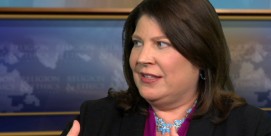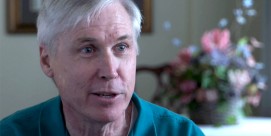In This Episode << SLIDE LEFT TO SEE ADDITIONAL SEGMENTS
Look Ahead 2010 Roundtable
BOB ABERNETHY, anchor: Welcome. I am Bob Abernethy. It’s good to have you with us. We take our look ahead now to the stories we expect to cover in the new year with the help of Jason Byassee of the Duke University Divinity School, where he directs its Faith and Leadership Project; E. J. Dionne of the Brookings Institution, the Washington Post, and Georgetown University; and with Kim Lawton, managing editor of this program. Welcome to you all. Jason, we have a recession. What’s going to happen to it, do you think, and what effect has it had and will it have on the churches, the denominations, the charities—all those people that you cover?
JAYSON BYASSEE, Duke Divinity School: I am struck by how you can’t have a conversation with a religious leader now without talking about what the financial downturn means for their organizations. This is across the board, from left to right, whatever position one has. What this means is that people are laying people off. They are cutting back on ministries. I wonder if this isn’t the story upcoming. Lots of our denominational infrastructures were built at a time when you could assume money would keep coming in. Well, it’s not now, and how do you do more with less? Nobody is quite sure how to do that.
KIM LAWTON, managing editor, Religion & Ethics NewsWeekly: Talking about doing more with less, the recession is also having a terrible impact on the people in the pews of all of these religious congregations, the people that these ministries serve. These people are hurting more than ever. They need help. They need resources. They go to the religious institutions, who are struggling. So it’s a real problem.
E.J. DIONNE, Brookings Institution: The entire not-for-profit sector has been hurt. Now, there is some hopeful evidence that sometimes some people actually step up and give a little more when they can to groups helping the very poor, because they have an even better sense than usual about “there but for the grace of God go I”—that possibility. The economy is going to be critical to so much of what happens this year. It’s going to be crucial politically to what happens in the 2010 elections. You can almost predict on a straight line if the economy feels like it’s getting substantially better by the midyear, President Obama and the Democrats are probably going to do better; if it feels like it’s not getting better it will be a large problem for them. That’ll have an effect on how we discuss all kinds of questions, including moral and religious questions, in the course of the year.
ABERNETHY: Jason, do you see people going into the ministry, or not going into the ministry, because of the recession? Do you see seminaries closing, churches closing?
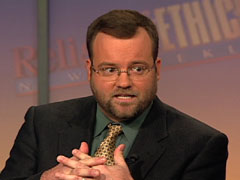
Jayson Byassee |
BYASSEE: The standard assumption is that when the economy is bad people go to school, because work is not good. The problem with that is, if you can’t sell your house then it’s pretty hard to move across the country and go to school. Lots of seminaries are trying to do more online education. I expect more of that to come. But there is enormous pressure, especially on small seminaries that aren’t connected to a big university, and dire predictions about how many of those may close in the coming years. That might not seem like a big thing until you realize, okay, where my minister was trained means everything for what I’m going to hear about God. This has an outsize ripple effect on institutions across the board and religion in this country, I think.
ABERNETHY: E.J., it is an election year again. What do you see as a result of that that will be of particular importance to believers?
DIONNE: I think, first of all, we may have the discussion on morality and the economy that was, I think, a little bit delayed, that people were trying to come to terms with what the downturn meant. I think there is going to be now a real look back and look forward as to why did we get into this mess—how much of it were practical problems, how much of it were about people not taking responsibilities seriously that they should have—the stewards of our economy, the people with a strong position in our economy. I think that debate will very much affect the elections. I also think we’re going to have a kind of after-effect of our big health care debate. I think what you saw among religious groups, particularly Christian religious groups, were a real difference between those who laid the heaviest stress on the moral imperative to getting everyone, or as many people as possible, covered through insurance, versus those who felt that the major emphasis on whether abortion is or is not funded and how in this health care debate. I think that’s going to have a continuing effect, because I think there is this running dialogue, certainly in the Catholic Church that I’m part of, but I think in all of our traditions, between those who believe the central emphasis of our religious group should be on a certain relatively narrow—though they would say very important—list of moral questions: abortion, gay marriage, stem cell research versus those who say that the emphasis should be on a much broader agenda having to do with social justice and how we organize our lives together in the economy. I think that discussion is going to very alive, made all the more so by the controversy of an election year.
LAWTON: It’s going to be interesting to see how involved faith-based activists get in these midterm elections. Certainly Barack Obama mobilized a very active campaign effort among especially moderate and liberal faith-based individuals. There was activity on the religious right as well against him. But will a Democratic candidate at the state level be able to get that same sense of energy? Will they come out? Meanwhile, the religious right is still really trying to figure out who they are, who’s going to lead them, and what they’re going to do. The Republicans are trying to figure out what do we do with this core of our party? So it will be fascinating to watch all of that unfold in the coming months.
DIONNE: Although I do think there’s one interesting thing that’s happened on the right, at least in the last year, which is I think the religious conservative voice has been less powerful than the voice of, whatever you want to call it, this Tea Party movement. There seems to have been a shift within the right from an emphasis on moral questions that the religious conservatives were focused on to this very strong anti-government strain. Now, obviously, there are overlaps on the conservative side, but I think this is a different sort of direction that we’ve seen on the right side of politics.
LAWTON: But we’ve seen, especially with the health care debate last year and the role abortion played within that debate, those social issues are still very important to a lot of people and will still come up, I think, in the midterm elections.
BYASSEE: Much more quietly, along with that I am struck by how many dozens of churches in my area can’t afford a minister any more because of health care being so expensive, and yet the left has somehow not managed to have the kind of energy in favor of expanding health coverage by any stretch that the right has managed to have against it, it seems to me, because of this confluence of leadership in opposition.
ABERNETHY: Kim, what do you see coming about the all the issues around gay marriage and what jobs homosexuals can have in the churches?
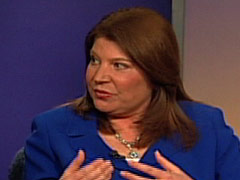
Kim Lawton |
LAWTON: This is going to be a very important year within the worldwide Anglican Communion. The US Episcopal Church, which is the branch here of the worldwide Anglican Communion, has moved forward. The Los Angeles diocese has elected an assistant bishop who is a lesbian. The worldwide community had asked the US church please don‘t move forward on this. She would be the second one. Her election needs to be confirmed within the next few months before she would be officially installed in May, so that’s still coming up. But the world is watching in the Anglican Communion, and many people are not happy about this, so this is going to be really important. We’ve been talking for years about is the Anglican Communion going to hold together? I think this year could be very crucial on that question.
BYASSEE: It seems like the first election, you could make space for it being a naïve move, or a misstep move, if you were in opposition. A second one, you can’t make that claim any more. The striking thing to me about this election is not so much that Mary Glasspool is a lesbian, but do you really need three Episcopal bishops in Los Angeles? Again, is it a structure set up for a time when the money was flush, and now does it make sense any more?
DIONNE: I’ve thought about this the last couple of years, where we have focused so much of the debate on the issue of gays and lesbians. It strikes me that, within the Christian Church for 100-150 years there have been episodes of modernity confronting tradition and that, right now, the center of that debate is around issues related to gay rights. But when you listen to some of the conversation—why people are for or against gay rights—it’s really part of this much deeper struggle that’s been going on within Christianity for a long time of how much its task is to resist modernity versus how much of its task is to respond to modernity, if you will, in a more dialectical way, with some opposition but also embracing some of what modernity has to give us. I think this episode is just—there is a particular passion behind this, because this is obviously a major step in this long argument.
LAWTON: Another interesting aspect to this particular debate, when you are talking about the Anglican Communion, is the demographic changes of Christianity around the world. So you have Christians in Africa and Asia who have the numbers. There’s millions of Christians in Uganda and Rwanda and Sudan. These tend to be more conservative on some of these issues—much more conservative, especially on the issue of homosexuality, and where their place is in the international Christian family is very much up for grabs in this particular debate.
DIONNE: Indeed, Christianity is growing. I think it’s a great shock for people to realize that there are many more Anglicans in Africa than there are Episcopalians in the United States.
BYASSEE: There’s twice as many Anglicans in Sudan as there are in the United States—just one big country in Africa. I don’t think we’re anywhere near catching up with what this means, not only on social issues but on doctrine, worship life, and all the rest. What’s it going to mean, not very long from now, that Christianity is essentially an African religion and not a Western one, not a North American or European one?
DIONNE: You’re seeing that, to some degree, in the debate about global warming. I do think the environment is another area where we’re going to see continuing activism and debate within the churches. The presence of a very strong group of Third World Christians in all of the denominations is going to put the focus not simply on the issue of reducing carbon in the atmosphere, but also on what kind of compensation Third World countries will get, which became a very critical issue in the discussions in Copenhagen.
ABERNETHY: Let me move to another point, Kim especially. There is an investigation going on, or a review, or whatever is the right term for it, of Catholic nuns in this country by the Vatican. Where is that going, and when will we know what comes of it?
LAWTON: The Vatican says that it wants to look into the quality of life for US sisters. That has created a huge amount of consternation here in the US, as there are questionnaires that have been sent to different communities of sisters with a lot of questions. Many of them feel like we’re not going to answer some of these. So that’s going to be moving forward throughout this year, as that sort of give-and-take moves forward. Do they answer these questions? What do they say? How do they say it? What’s really behind all of these questions in the first place? That’s what a lot of people, not just among nuns but across the Catholic community, want to know. What’s really behind this study, this investigation?
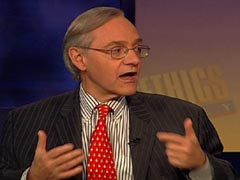
E. J. Dionne |
DIONNE: There’s a great danger here. I think this could prove a very, very divisive move inside the church. There is enormous affection toward nuns among people who are Catholics. Many of us owe enormous debts to them for our educations and for so many other things they did. They are among the most activist—that’s a bad term in the eyes of some conservatives—as in giving comfort to the poor, helping the sick, doing all the things the Gospel says we should do. And so they risk, I think, a real backlash, if they don’t handle this very carefully. I think they are already confronting it, to some degree. They’ve got to be very careful with the nuns. I’ve got some nuns that sent that message.
BYASSEE: It is an interesting question. If you have an enormously radical form of life, based on what Jesus said we should do, can you be liberal doctrinally? It sounds like the answer may be no, right? That’s a very risky answer…
DIONNE: The answer from the Vatican may be no. It’s not clear to me that there is, first of all, any consistent sort of liberal doctrinal positions, and to the extent that they are somewhat more liberal—for example, in asserting that perhaps there is a bigger role for women to play in the authority structure of the church—it shouldn’t surprise that perhaps that the nuns, who have taken so much responsibility for helping run the church, just might have a view like that.
BYASSEE: My wife, who is a pastor, would “Amen” your claim. I think that’s right.
ABERNETHY: Jason, you study and help identify future leaders in the churches. What do you see? Some of the familiar old names are no longer so familiar. Oral Roberts died. Where is it going? Who do you see out there who’s going to succeed the people we used to hear about so intensively with the religious right?
BYASSEE: One thing that interests me is that there’s less of an emphasis, if you’re a younger evangelical leader, on starting a parachurch ministry like Billy Graham did, and more of an emphasis on being a pastor. I’m not exactly sure why this shift has happened, but if you’re a young pastor, you’re charismatic, what you want to do is plant a church usually and grow it big and have that be where your ministry is. So I see a lot of pastors of enormous churches—in places like Seattle and Grand Rapids—who have churches of 20-30,000 people. You don’t hear about them in the national news yet. You don’t hear Rob Bell’s name. You don’t hear Mark Driscoll’s name. You’re hearing Tim Keller’s name in Manhattan more because he’s writing books that have gotten attention. Same with Rob Bell. But these are pastors who are sort of a half-generation after Rick Warren, or Bill Hybels at Willow Creek, who are going to have an enormous impact, because if you want anyone to catch a religious allusion in politics in 20-30 years, it’s likely to be because one of these pastors helped teach a congregation to hear the Scriptures, right? If people are going to be serving the poor, it’s going to be because churches like this—like Adam Hamilton’s church in Kansas City, Church of the Resurrection—encourage people to do that and made space and structure for them to do it. So I think that’s an enormous shift.
LAWTON: One thing I’m watching is, with some of the folks you just referred to that already have these big megachurches, what happens when those leaders—people like Rick Warren at Saddleback Church, people like Bill Hybels in Willow Creek, built these giant congregations—what happens when they retire, though? What happens to those congregations? It’s really hard to step in to a congregation that’s already in process. That’s something I’m really going to be looking at.
ABERNETHY: I want to hear, Jason, what you have to say, and E.J.—each of you—about kind of the state of religious life and of organized religion in this country today. How is it going? Is secularism pushing it aside? What’s happening?
BYASSEE: It does seem to me that the new atheist books gave a certain permission to people to claim that they are not religious, that you don’t have to have the default be, oh yeah, I’m a Christian, even though I don’t do anything. Now it can be no, I’m not religious, and that seems to be more socially okay. Of course, being biased people in religious institutions—I spend all my time with religious leaders for whom things are very vibrant, right—but I think we shouldn’t overlook the fact that there are a whole lot of people who aren’t engaged by the church and its ministries and would much rather they go away, especially at election time.
ABERNETHY: Sixteen percent, I think, identify themselves as having no affiliation. E.J., what do you see? How is the tide running?
DIONNE: I wrote a column some years ago that ran under the headline, which I openly took from The New Republic. The headline was “God Bless Atheists.” I think one of the things about this atheist challenge that’s actually good for believers and good for Christians is that it has created a debate on the fundamentals. I don’t mean by that fundamentalists; I just mean the fundamental tenets of does God exist? How do you know God exists? What is the relationship between God and humankind? These debates have gone on for centuries. A lot of what the new atheists say are new versions of very old arguments that have been taking place. I think it’s far better to surface these arguments than to have people either pretend to believe when they don’t, or have believers not have to confront really core challenges to belief itself. And so, at bottom, if you can say this whole debate may be providential.
LAWTON: I think we need to be careful, too, when you look at some of these numbers. A lot of those people who are unaffiliated—it doesn’t mean that they’re not religious or spiritual in some way. They’re just not necessarily associating themselves with a particular organization or institution.
BYASSEE: It does seem important that these numbers bump when there is an election that people are unhappy about. It seems like there’s been some behavior from religious people that they’re displeased by, so it seems like the 2004 election, in particular, got a bunch of people book contracts to write about how bad God is.
ABERNETHY: Kim, there are some Supreme Court decisions coming down of some interest.
LAWTON: I think this coming year will see some interesting decisions about the conflict between religion and the public square. One is the Mojave cross. Can there be giant crosses in public property? Another one that I find particularly interesting is that the Supreme Court will be looking at a case with the Christian Legal Society and whether a law school can—the Christian Legal Society has a student club and they also believe that gays should not be in their leadership or their voting members, because that’s part of their religious belief. Well, the law school where they were operating said, well, if you believe that, you can’t be part of an official student group, because we don’t discriminate based on sexual orientation. So you have this clash of religious values. On the one hand, you have people who want to exercise their religious beliefs. And then you have people who say this is a matter of human rights or civil rights. Then those start clashing. Who trumps whom? So that’ll be interesting.
DIONNE: That’s a hugely important and really fascinating case, because you’re dealing with, in a sense, two conceptions of liberty, two conceptions of whether people should be free to be gay, and no organization on the campus should discriminate against them, and one can see how one gets to that conclusion, versus the right of the Christian Legal Society to constitute themselves as a group that has a very particular view on homosexuality. I think it could be a very bitter argument, precisely because each side is going to claim—they’re going to have competing goods, as each side will claim competing notions of freedom.
ABERNETHY: E.J., quickly, what are you going to be looking forward to particularly in the coming year? What stories?
DIONNE: I am going to be looking forward to a continuing moral debate about how we should organize this economy and what got us into the mess we’re in, in the first place. I think it’s going to be a real test of whether Barack Obama’s efforts to tamp down the culture wars have us get along a little better, whether that will succeed. Like everybody else, I’m going to be looking at how the test of these last two years—how the last two years are judged by the voters in November.
ABERNETHY: I’m sorry, but our time is almost up. Many thanks to Kim Lawton, to E.J. Dionne, and to Jason Byassee. Happy New Year to each of you and to our viewers.




